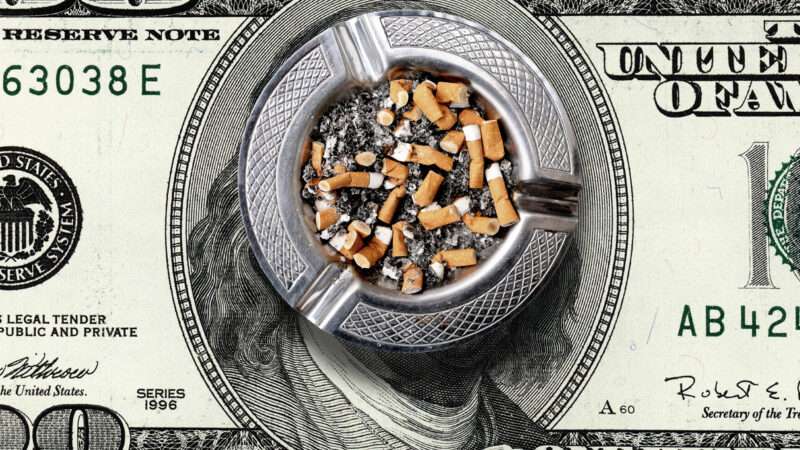
If you want to create a black market in a perfectly legal product, just make regulations and taxes so onerous that many people prefer to buy from illegal vendors to escape being hassled and mugged by the powers that be. As a new study reveals, that’s certainly the case with cigarettes, which remain available for sale across the United States but with much of the trade continuing to involve smokes smuggled from one jurisdiction to another. Since busybody politicians refuse to learn from the ongoing trade, this is a tempting business opportunity for risk-tolerant entrepreneurs as well as low-tax jurisdictions.
High Taxes Create Black Markets
“Higher tax rates incentivize smuggling,” Adam Hoffer and Jacob Macumber-Rosin write in the latest edition of research regularly compiled by the Mackinac Center for Public Policy and the Tax Foundation. “As tax rates increase, consumers and suppliers search for ways around these costs. In cigarette markets, consumers tend to shop across borders where the tax rates are lower and dealers develop black and gray markets to sell illegally to consumers, paying little or no tax at all.”
Agreeing with that point would be the Massachusetts Illicit Tobacco Task Force, which earlier this year put out a report pointing to declining tobacco tax revenue while smuggling thrives.
“Generally, the Commonwealth’s high tax rates…relative to other states provide smugglers an incentive to import such products from low-tax states and sell them to in-state buyers willing to illegally evade payment of the applicable Massachusetts tobacco excise,” conceded the report’s authors. “Intelligence received from inspectors, investigators, and law enforcement officers working in the field indicates that the smuggling of untaxed tobacco and [Electronic Nicotine Delivery Systems] products remains a challenge.”
At $3.51 per pack, Massachusetts isn’t even the most heavily taxed state when it comes to cigarettes, nor does it have the largest black market in tobacco products. That honor belongs to New York, which last year raised its tax rate to $5.35 per pack (New York City adds another $1.50).
“New York has the highest inbound smuggling activity, with an estimated 54.3 percent of cigarettes consumed in the state deriving from smuggled sources in 2022,” note Hoffer and Macumber-Rosin. “New York is followed by California (46.7 percent), New Mexico (41.2 percent), Massachusetts (39.7 percent), and Washington (36.8 percent).”
The cigarette-tax study authors add that because their tax rates drive people to purchase their smokes from illicit dealers, high-tax states suffered a revenue hit in 2022 of more than $5 billion. Since 2007, they’ve lost out on more than $79 billion.
Intrusive Rules Also Fuel Black Markets
Regulations matter, too. With flavored tobacco banned in places like California and Massachusetts, those products are available in those states only on the black market.
“The first state to implement a statewide menthol flavor ban was Massachusetts,” according to Hoffer and Macumber-Rosin. “Its menthol flavor ban took effect in June 2020. In the 12 months following implementation, sales in the Bay State declined by almost 24 percent compared to the 12 months preceding the ban…. Importantly, these sales did not disappear; most of the transactions merely moved to neighboring states or to illicit markets.”
“Field personnel are routinely encountering or seizing untaxed menthol cigarettes, originally purchased in other states, and flavored ENDS products and cigars purchased from unlicensed distributors operating both within and outside the Commonwealth,” confirmed the Massachusetts report.
Low-Tax States Benefit From Smuggling
Of course, if high-tax states are losing out because their revenue appetites exceed their grasp, somebody is benefiting. That certainly includes the smugglers who transport merchandise from low-tax states to sell to willing buyers eager to escape the government’s grasp in high-tax states. But it also includes low-tax jurisdictions that benefit from sales made for the sake of export. That, quite rightly, is a point of pride in certain quarters.
“New Hampshire is the No. 3 state in the country for outbound cigarette smuggling, resulting in a revenue windfall,” reported Andrew Cline for the New Hampshire Journal. “From 2007-2022, New Hampshire earned $955 million in state revenue from cigarette buyers who then smuggled their purchases to higher-tax states, according to the report.”
New Hampshire taxes cigarettes at the rate of $1.78 per pack, which is relatively low. As a result, find the Mackinac Center and the Tax Foundation, 31.43 percent of cigarette sales are for smuggling elsewhere. That puts it in third place after Wyoming, where 49.2 percent of cigarette sales are smuggled out of state, and Delaware, where 34.4 percent of sales are resold in higher-tax jurisdictions.
The International Connection
Hoffer and Macumber-Rosin point out that smuggling doesn’t just occur between states. High taxes and burdensome regulations create a thriving market for cigarettes smuggled in from overseas, many of them bogus products produced purely for illicit sale.
“Estimates put Chinese counterfeit production as high as 400 billion cigarettes per year to meet international demand,” they write. “Because of the enormous volume of product that ships into US ports from China, it may be easier and lower cost to smuggle Chinese cigarettes into California markets through US ports than to try to capitalize on tax arbitrage by transporting products across the continental US.”
There’s a lesson here for policymakers and activists who seek to discourage consumption of otherwise legal products that they don’t like through confiscatory sin taxes and intrusive red tape.
“During the prohibition of alcohol in the United States during the 1920s, increased enforcement failed to significantly decrease the prevalence of bootlegging because the profit margins were so large and the distribution networks sophisticated,” point out Hoffer and Macumber-Rosin. “The same is true for today’s cigarette smugglers.”
If people want access to a product or service, their demand doesn’t go away just because lawmakers disapprove. Instead, demand attracts suppliers—legal vendors in properly functioning markets and illegal ones when government tries to get between buyers and sellers. The result is the same as results from outright prohibitions: The market provides whether meddling officials like it or not.
The post Cigarette Taxes and Regulations Continue To Fuel a Thriving Black Market appeared first on Reason.com.







